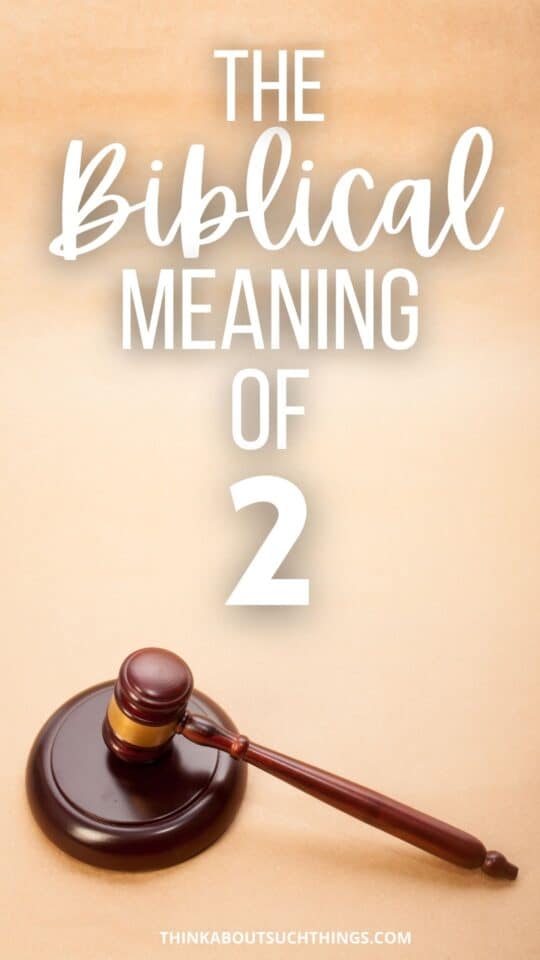What Does The Number Two Mean In The Bible
The number two holds a fascinating place in biblical numerology, often symbolizing duality, partnership, and unity. But what does it truly mean when we encounter this number throughout the sacred texts? Have you ever considered how this simple digit can evoke profound theological implications? Let's delve into the multifaceted interpretations of the number two in the Bible and explore its enchanting symbolism.

First and foremost, the number two frequently embodies the essence of duality and opposition. It invites us to ponder the idea of contrasting elements or forces, much like light versus darkness, or good versus evil. In Genesis, we witness the creation of man and woman, where the emergence of Eve from Adam establishes a partnership designed for mutual support and companionship. This harmonious pairing is not merely about coexistence; it underscores the intrinsic value of relationships in God’s creation. The very first couple was not only a union but also a vital reminder that two beings can complete one another.
Moving beyond the union of Adam and Eve, the number two also introduces us to the concept of witness. According to Deuteronomy 19:15, "A single witness shall not suffice against a person for any crime or for any wrong in connection with any offense that he has committed. Only on the evidence of two witnesses or of three witnesses shall a charge be established." Here, the biblical text emphasizes the necessity of corroboration. The symbolic significance is charming yet profound: truth is often discovered through collaboration and confirmation. This invitation to seek out multiple perspectives is an enlightening reminder of human connection and accountability.
Moreover, the number two is emblematic of partnership, as portrayed in the pairs often found throughout biblical narratives. Consider the concept of two testaments: the Old and the New Testament. These two halves create a cohesive story of redemption and grace, each complementing the other. The Old Testament lays the groundwork of God's law and the anticipation of a Messiah, while the New Testament reveals the fulfillment of these promises through Jesus Christ. The dynamic interplay between these covenants emphasizes the importance of understanding God’s overarching narrative, where each testament contributes uniquely to the grand tapestry of salvation history.
In the realm of prophecy and revelation, two also plays a pivotal role. In the Book of Revelation, the idea of two witnesses emerges as a critical component of the eschatological narrative. Revelation 11 introduces these two prophetic figures, who are empowered to proclaim God’s truth during tumultuous times. Their joint testimony signifies the essentiality of communal witness in bearing faith under persecution. Here, the number two encapsulates the potency of collective action when contending against adversity. But how do these instances of harmony, partnership, and duality challenge our understanding of faith in today’s world?
Now, let’s confront the playful challenge—How often do we extend our comprehension of faith to include the necessity of partnerships in our spiritual walk? Are we valuing the role of community as the Bible illustrates through its symbolism around number two? Relationships, whether familial ties, friendships, or congregational connections, shape the fabric of our faith journey. The number two serves as a gentle nudge towards intentionality in how we engage with others in our pursuit of spiritual growth.
Also noteworthy is the significance of Jesus sending out His disciples two by two, as recounted in the Gospels. This strategic commission underscores the principle of companionship in ministry. Just as the disciples embarked on their mission side by side, believers today are encouraged to reach out in pairs and small teams. This dynamic fosters shared experiences, accountability, and the ability to celebrate victories together. It prompts us to reflect on whether we are actively seeking others to journey with us on our spiritual expeditions.
The number two transcends mere numerology in Scripture, as it subtly interweaves with profound truths that speak to the human experience. Moreover, it stirs our hearts to contemplate the intricate design of divine relationships—both vertical, with God, and horizontal, with others. Each relationship we nurture offers an opportunity to exemplify God's love and grace, increasing our understanding of unity, harmony, and purpose.
Another tantalizing aspect of the number two is its recurrent playfulness. Have you encountered the two trees in the Garden of Eden? The Tree of Life and the Tree of Knowledge of Good and Evil symbolize choices. Adam and Eve had the freedom to choose, an echo of the duality inherent in human existence. How often do we grapple with choices that reflect our moral convictions versus our earthly desires? The duality presented through these trees serves not only as a historical account but also as a present-day reminder of our own choices in navigating life’s complexities.
As we explore the number two, we are invited to engage with the symbolism it represents—whether through companionship, the pursuit of truth, or our own choices. The biblical portrayal of this number enriches our understanding, urging us to cherish bonds with others, seek truth collaboratively, and navigate our spiritual paths with intentionality. So, the next time you encounter the number two in the Bible, pause for a moment. Ask yourself: What are the dualities present in my life? How can I embody the lessons of partnership and community as I walk this journey of faith?
In conclusion, the significance of the number two in the Bible opens up a treasure trove of narratives and meanings that challenge and inspire. It compels believers to recognize the importance of relationships, witness, and choice in their spiritual framework. Each exploration of this number offers an invitation to deepen our understanding of God’s design for unity, encouraging us to surround ourselves with others who help us flourish in faith.
Post a Comment